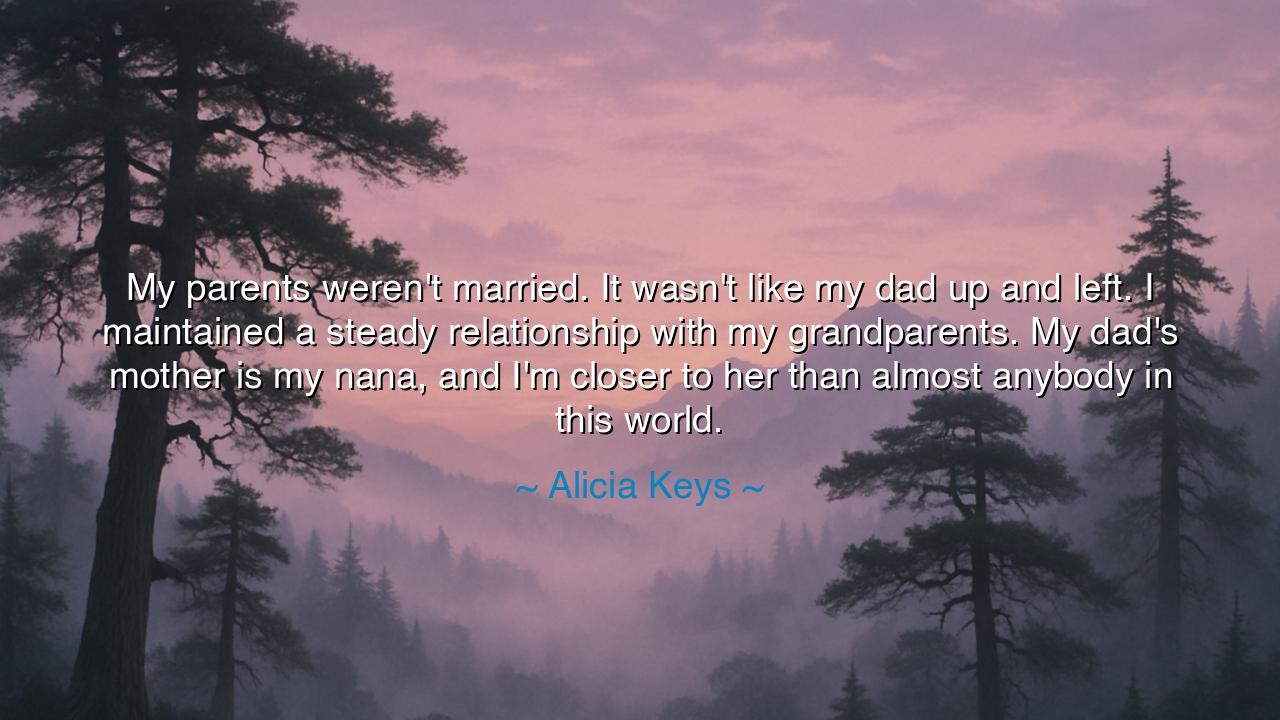
My parents weren't married. It wasn't like my dad up and left. I
My parents weren't married. It wasn't like my dad up and left. I maintained a steady relationship with my grandparents. My dad's mother is my nana, and I'm closer to her than almost anybody in this world.






“My parents weren’t married. It wasn’t like my dad up and left. I maintained a steady relationship with my grandparents. My dad’s mother is my nana, and I’m closer to her than almost anybody in this world.” Thus spoke Alicia Keys, the songstress of soul and truth, whose voice carries not only melody but wisdom. In these tender words, she unveils a truth both simple and profound — that family is not defined by form, but by love; that wholeness is not found in perfection, but in connection; and that the bonds which sustain us are not always those prescribed by the world, but those born of the heart. Her words, like her music, echo with sincerity, reminding us that even when life’s structure seems broken, the spirit of love can still bind it together with unbreakable strength.
The origin of this quote rests in Alicia Keys’ own life — a life shaped by courage, independence, and deep compassion. Born in New York City to a single mother, she grew up in the raw vibrancy of Harlem, surrounded by struggle and beauty intertwined. Her parents were not married, and her father, though not absent in spirit, was distant in presence. Yet Alicia never let that distance define her. She built her understanding of family not through bitterness, but through gratitude for those who remained, especially her grandmother — her “nana” — who became one of the pillars of her soul. In this, she teaches that even when the traditional paths of love and family diverge, new paths can still lead to belonging.
The meaning of her reflection lies in its embrace of imperfection. Many would see a fractured home and speak of loss, but Alicia sees continuity — the persistence of care, the endurance of relationship. Her words defy the narrow notion that family must fit a single shape. She acknowledges what was missing, yet celebrates what was present: the steady relationship with her grandparents, the nurturing presence of her nana, the threads of love that wove through the gaps. This is the wisdom of acceptance, the ability to find harmony in a melody others might call dissonant.
Her story is not hers alone; it mirrors the lives of many who have been raised by those outside the expected circle of parents — grandparents, aunts, uncles, or friends who step in when others cannot. History itself is filled with such examples. Consider George Washington, who, after losing his father at a young age, was raised by his elder brother and others who guided him with firmness and affection. The man who would one day become the Father of a Nation did not find greatness through the traditional image of family, but through the strength of those who loved him enough to fill the void. In the same way, Alicia Keys reveals that the hands that raise us do not need to share our bloodline; they only need to share our hearts.
Yet, there is also a quiet rebellion in her words. When she says, “It wasn’t like my dad up and left,” she defends truth against assumption. Society often seeks to label and judge — to see a single mother and presume abandonment, to see an unconventional family and imagine failure. But Alicia’s life stands as testimony that love defies narrative. Her father’s presence may not have been constant, but it was not absent of care. Her grandparents’ love filled the spaces between. In her reflection, she calls us to abandon judgment and embrace the understanding that every family, in its own imperfect way, tells a sacred story of endurance.
At its core, this quote is not merely about family — it is about gratitude and balance. Alicia does not dwell on what she lacked; she celebrates what she received. In this, she embodies a timeless truth: that peace comes not from having everything, but from recognizing the beauty of what remains. Her closeness with her nana, her reverence for that bond, speaks to the eternal power of intergenerational love. The wisdom of elders, passed through warmth and patience, becomes a foundation stronger than circumstance. Her nana’s presence, like a steady flame, nurtured her through the coldness of absence and the chaos of youth.
Therefore, O listener, let this teaching dwell in your heart: family is not a structure but a spirit. Do not measure love by titles or traditions, but by the constancy of care. If life has given you gaps, fill them with gratitude. If you have been raised by hands that were not expected, honor them doubly. Seek not perfection in your lineage, but connection in your living. For what Alicia Keys teaches us is that love finds its way — through hardship, through difference, through time. It may come not from the direction you expect, but when it does, it will anchor you more deeply than anything else.
And so remember her words as you walk your own path: what matters is not who was meant to love you, but who chose to. Cherish them. Nurture them. Be, for someone else, what her nana was for her — a source of steady love in an unsteady world. For in doing so, you honor not only your past, but the eternal truth that family, in its purest form, is the gathering of souls who choose to love each other, again and again, through all of life’s imperfections.






AAdministratorAdministrator
Welcome, honored guests. Please leave a comment, we will respond soon